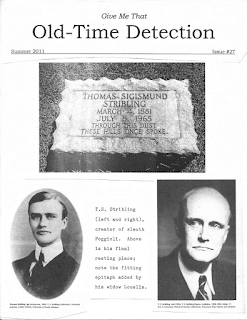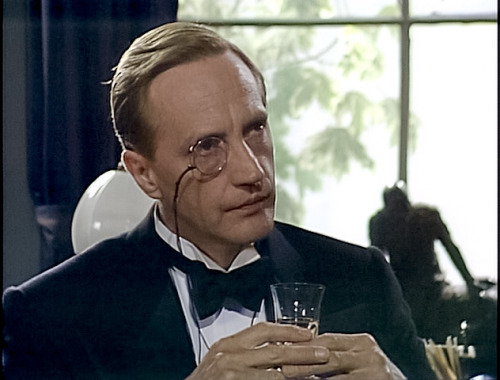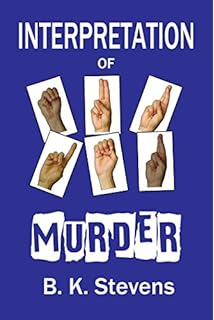I’ve been pestering Arthur Vidro to submit an article ever since he was kind enough to send me a copy of Old-Time Detection, which I read with my feet propped up in the waiting area of an old-time tire repair shop. Before me, Dale Andrews not only invited Arthur, but has written about him more than once.
Arthur lives in Claremont which, as Dale has noted, is the pattern for Ellery Queen’s Wrightsville. His address is on… Ellery Street.
Arthur hand-publishes Old-Time Detection three times a year, a labor of love. As you might surmise, OTD eschews many of our modern means of publishing, but then its focus is not of this century. It harks back to when detectives used deduction and ratiocination rather than rely on electronic surveillance and CSI labs. That word ‘ratiocination’… I learned its definition as a kid reading golden age mysteries. When has anyone read that word in a novel in the past half century?
The following originally appeared in the Autumn 2008 issue of Old-Time Detection. [Mr. Vidro’s notes appear in brackets.]
For more information about subscribing, contact Arthur at oldtimedetection(at)netzero(dot)net
Arthur lives in Claremont which, as Dale has noted, is the pattern for Ellery Queen’s Wrightsville. His address is on… Ellery Street.
Arthur hand-publishes Old-Time Detection three times a year, a labor of love. As you might surmise, OTD eschews many of our modern means of publishing, but then its focus is not of this century. It harks back to when detectives used deduction and ratiocination rather than rely on electronic surveillance and CSI labs. That word ‘ratiocination’… I learned its definition as a kid reading golden age mysteries. When has anyone read that word in a novel in the past half century?
The following originally appeared in the Autumn 2008 issue of Old-Time Detection. [Mr. Vidro’s notes appear in brackets.]
For more information about subscribing, contact Arthur at oldtimedetection(at)netzero(dot)net
— Leigh Lundin
Anthony Boucher's 1951 List of 44
[42 novelists plus 2 short-story writers]
by Anthony Boucher
annotated by Arthur Vidro
[42 novelists plus 2 short-story writers]
by Anthony Boucher
annotated by Arthur Vidro
In June 1951, Ellery Queen asked his fellow crime writers:
“Would you care to nominate the ten best living detective-story writers? “For your convenience, why not use the back of this letter, and the stamped, addressed envelope enclosed.”Probably the most thorough reply to Fred Dannay's request for a top ten list came from mystery writer and critic Anthony Boucher. His response merits being quoted in full. The names he cites, by his merely citing them, give 21st century readers a dazzling roster of worthy authors to read. I don't know how much time Boucher spent in crafting his reply, but clearly he was enjoying himself; this was no mere annoying task for him, but a challenge he tackled with enthusiasm.
— Fred Dannay [of the Ellery Queen collaboration]
Boucher's reply, from Berkeley, California, was among the earliest received; it was dated June 14, 1951 and typed on the letterhead of the Fantasy & Science Fiction magazine, which was edited by Boucher and published by Spivak:
Dear Fred,
You're a menace!
You know I take my responsibilities seriously and can't just go jotting ten names down on the back of a letter – and you also know I never can resist such queries… and there goes a large chunk of F&SF's working day. Spivak should sue you.
Anyway:
My list of ten is not just living writers – it's contemporary practicing professionals, not including those who happen to be alive but are not actively important; order is alphabetical:
Nicholas BlakeA major criterion in selection was not only quality, but individuality and distinction.
John Dickson Carr/Carter Dickson
Agatha Christie
Erle Stanley Gardner / A.A. Fair
Michael Innes
Ngaio Marsh
Ellery Queen / Barnaby Ross
Georges Simenon
Josephine Tey
Cornell Woolrich / William Irish / George Hopley
[Always the completist, Boucher insisted on including each author's known pseudonyms – in Woolrich's case, more than one pseudonym. He also felt obliged to bestow honor upon top writers who no longer were adding much to their prior accomplishments.]
Here's a supplementary list of twelve living writers of the first rank who have stopped writing (at least in our field) or made only a few insignificant contributions in recent years:
Eric AmblerThese lists are, incidentally, based primarily on the novel – thus excluding such figures as T.S. Stribling, who's written only shorts, or Roy Vickers, whose novels are usually ghastly. [Vickers won much acclaim for his Department of Dead Ends police investigative short stories. Stribling, a Pulitzer Prize winner for his novel-length fiction, is well worth seeking out for his short stories featuring criminologist Dr. Henry Poggioli – some of which are in print, courtesy of Crippen & Landru Publishers.]
E.C. Bentley
Anthony Berkeley / Francis Iles
Raymond Chandler
Freeman Wills Crofts
Graham Greene
Dashiell Hammett
Ronald A. Knox
Philip MacDonald
A.E.W. Mason
Craig Rice
Dorothy L. Sayers
You might also be interested in the list of also-rans. These are the people who only barely got squeezed off the first list:
Margery Allingham[John Ross Macdonald would later become more famous as Ross Macdonald. The Lockridges refers to the husband/wife mystery writing team of Richard and Frances Lockridge.]
Charlotte Armstrong
Manning Coles
Edmund Crispin
Elizabeth Daly
Cyril Hare
Matthew Head
H.F. Heard
Elisabeth Sanxay Holding
the Lockridges
Helen McCloy
John Ross Macdonald
Margaret Millar
Q. Patrick/Patrick Quentin
Elliot Paul
Evelyn Piper
Mabel Seeley
Rex Stout
Lawrence Treat
Arthur W. Upfield
Do keep me posted and Tell Me All about this poll.
TIMES has decided to give me the whole mystery-review column for a four-month trial period starting July 1. I'll also be covering the science fiction field for the TRIB (as H.H. Holmes) … which is handy because I have to read all that for F&SF's reviewing column anyway.
[TIMES and TRIB refer to the newspapers The New York Times and probably the New York Herald Tribune. H.H. Holmes was a pseudonym Boucher also used on two of his mystery novels, Nine Times Nine and Rocket to the Morgue.]
It took me a while (complicated by commuting to Los Angeles for the Hammett trial) to get over the illness with which I so spectacularly left New York; and I'm only gradually getting untangled and back to normal operations. I'll try to write you a proper letter soon – meanwhile please proffer my warmest devotion to Hilda.
Best,
Tony
Fred Dannay was married to Hilda Wisenthal from 1947 until her death in 1972. Boucher did not consider this list of authors to be a full-fledged letter, so he promises to provide one soon; he corresponded frequently with Fred Dannay. Dashiell Hammett in 1951 was convicted of contempt of court for which he served five months in jail. Boucher's “Criminals at Large” column in The New York Times would run from 1951 until his death in 1968.
Leigh again with a historical note:
The trial referred to grew out of the McCarthy hearings in which Congress demanded Dashiell Hammett brand friends as communists. The thought police ploy was nasty: If a respondent knew no communists or had the fortitude to not dime out acquaintances with different beliefs, the result was the same: imprisonment for contempt of court.Subscribe to Old-Time Detection ($18US per year, slightly higher elsewhere) by writing Arthur at oldtimedetection(at)netzero(dot)net
Punishment of six months in a federal prison wasn’t sufficient: Hammett was blacklisted, his radio program cancelled, his books taken out of print, and his financial resources drained by government fines and legal fees.
































